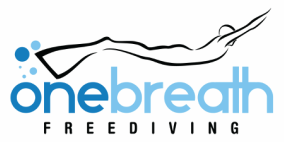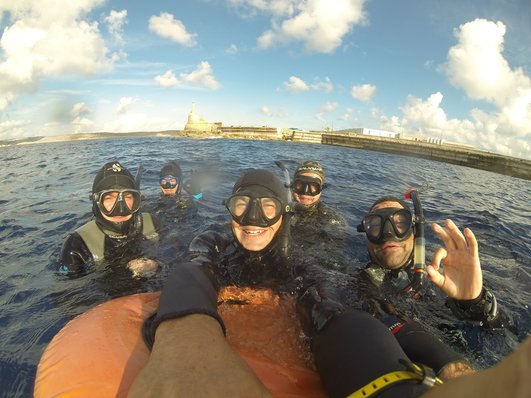Day 1
There was a total of 3 of us doing the course, so after we did our introductions we started on some classroom work. We also practiced the correct technique for ear equalizing and did some timed breath holds. Around midday we went to Malta's national pool to do the required 40m underwater swim. This is called Dynamic Apnea and the main points of this involved correct weight and buoyency, pushing off from the side of the pool and doing the first arm stroke, turning at the other end of the pool and getting to 40m. All these parts were covered in detail and we practiced our techniques until we were ready for the 40m. Rescue diver procedures were also taught and practiced during this pool session.
After the pool we went back to the classroom for the final theory for day 1 and briefly went over what the plan is for the second day.
Day 2
After a brief classroom session we entered the very calm water of Cirkewwa and setup the buoys in 20m deep water. First we practiced Free Immersion where you pull yourself down the rope. There were a few things to get right, such as relaxation, initial accent technique, then equalising and pulling yourself down the line.
After this session we went onto constant weight where we used fins and the correct technique to efficient finning. The AIDA2 course requires a dive of 16m-20m.
The day was very calm and relaxed and this was clearly a major part of freediving. Not pressure or stress to get things done, take your time.
Day 3
We met at the dive centre and had a quick briefing for the day's events. First off was the static apnea discipline at a sheltered area near Bugibba. To pass the course a 2 minute breath hold was required. I managed 3 minutes and felt like I could manage a few more seconds, but I was more than happy with myself achieving this time. We also had a go at being the coach. This involved steadying the person, timing, communication and watching for signals.
Next up was a trip to Cirkewwa again for the final open water dives before the exam. We did the constant weight again, like on day 2, but a little deeper and also practiced using a lanyard to keep you secured to the line as well as being a rescue diver who meets the other diver half way. With all the open water requirements completed we all headed to the classroom for the written exam.
My Final Points From a SCUBA Diving Background.
Very interesting learning about ears, equalising, lungs in lots more detail.
Knowledge of what's involved in freediving will allow me to be more aware of freedivers when I'm scuba diving.
Being relaxed is very important.
Finding a competent buddy you can trust. This must work both ways.
Learning what your body and mind is really capable of.
Overall the course was very enjoyable. David, the instructor was very informative and knowledgable. Detailed instructions and techniques were demonstrated and personal feedback was given throughout the day.
The 3 full days were good fun, calm, knowledgable and were the ideal environment for pushing your mental boundaries to an area it's difficult to imagine before the course.
AIDA2 requirements:
Static: 2 minutes. I managed 3 minutes. (Holding breath floating on surface)
Dynamic: 40m. I managed 40m on my second attempt. (In swimming pool).
Constant Weight: 16m. My maximum depth was 20m.
The exam was a mix of multiple choice as well as full answers and was straight forward if you followed the manual and classroom ok.
here to edit.
There was a total of 3 of us doing the course, so after we did our introductions we started on some classroom work. We also practiced the correct technique for ear equalizing and did some timed breath holds. Around midday we went to Malta's national pool to do the required 40m underwater swim. This is called Dynamic Apnea and the main points of this involved correct weight and buoyency, pushing off from the side of the pool and doing the first arm stroke, turning at the other end of the pool and getting to 40m. All these parts were covered in detail and we practiced our techniques until we were ready for the 40m. Rescue diver procedures were also taught and practiced during this pool session.
After the pool we went back to the classroom for the final theory for day 1 and briefly went over what the plan is for the second day.
Day 2
After a brief classroom session we entered the very calm water of Cirkewwa and setup the buoys in 20m deep water. First we practiced Free Immersion where you pull yourself down the rope. There were a few things to get right, such as relaxation, initial accent technique, then equalising and pulling yourself down the line.
After this session we went onto constant weight where we used fins and the correct technique to efficient finning. The AIDA2 course requires a dive of 16m-20m.
The day was very calm and relaxed and this was clearly a major part of freediving. Not pressure or stress to get things done, take your time.
Day 3
We met at the dive centre and had a quick briefing for the day's events. First off was the static apnea discipline at a sheltered area near Bugibba. To pass the course a 2 minute breath hold was required. I managed 3 minutes and felt like I could manage a few more seconds, but I was more than happy with myself achieving this time. We also had a go at being the coach. This involved steadying the person, timing, communication and watching for signals.
Next up was a trip to Cirkewwa again for the final open water dives before the exam. We did the constant weight again, like on day 2, but a little deeper and also practiced using a lanyard to keep you secured to the line as well as being a rescue diver who meets the other diver half way. With all the open water requirements completed we all headed to the classroom for the written exam.
My Final Points From a SCUBA Diving Background.
Very interesting learning about ears, equalising, lungs in lots more detail.
Knowledge of what's involved in freediving will allow me to be more aware of freedivers when I'm scuba diving.
Being relaxed is very important.
Finding a competent buddy you can trust. This must work both ways.
Learning what your body and mind is really capable of.
Overall the course was very enjoyable. David, the instructor was very informative and knowledgable. Detailed instructions and techniques were demonstrated and personal feedback was given throughout the day.
The 3 full days were good fun, calm, knowledgable and were the ideal environment for pushing your mental boundaries to an area it's difficult to imagine before the course.
AIDA2 requirements:
Static: 2 minutes. I managed 3 minutes. (Holding breath floating on surface)
Dynamic: 40m. I managed 40m on my second attempt. (In swimming pool).
Constant Weight: 16m. My maximum depth was 20m.
The exam was a mix of multiple choice as well as full answers and was straight forward if you followed the manual and classroom ok.
here to edit.

